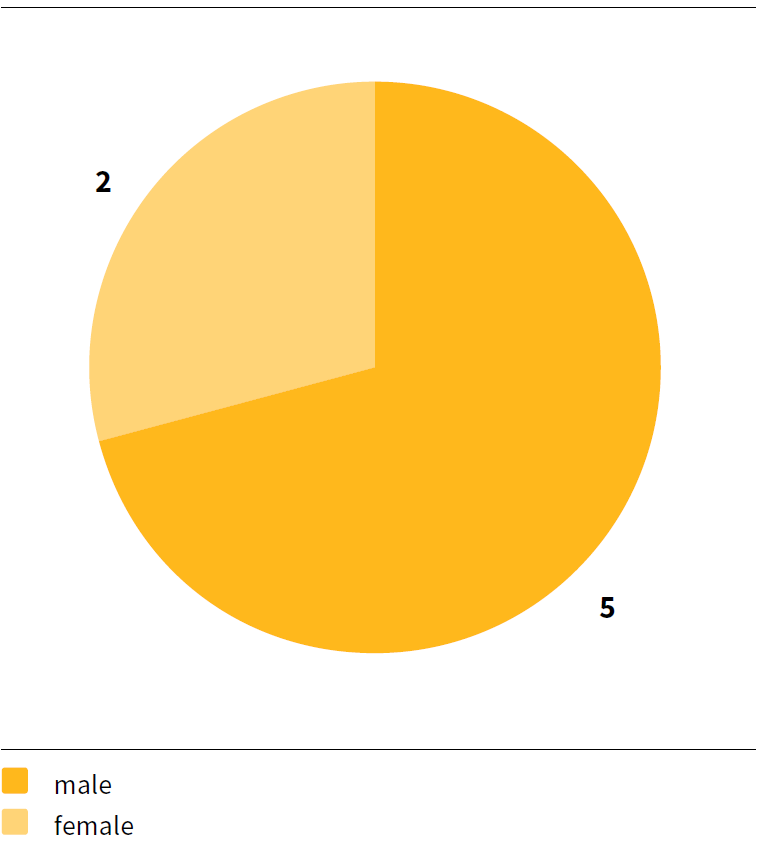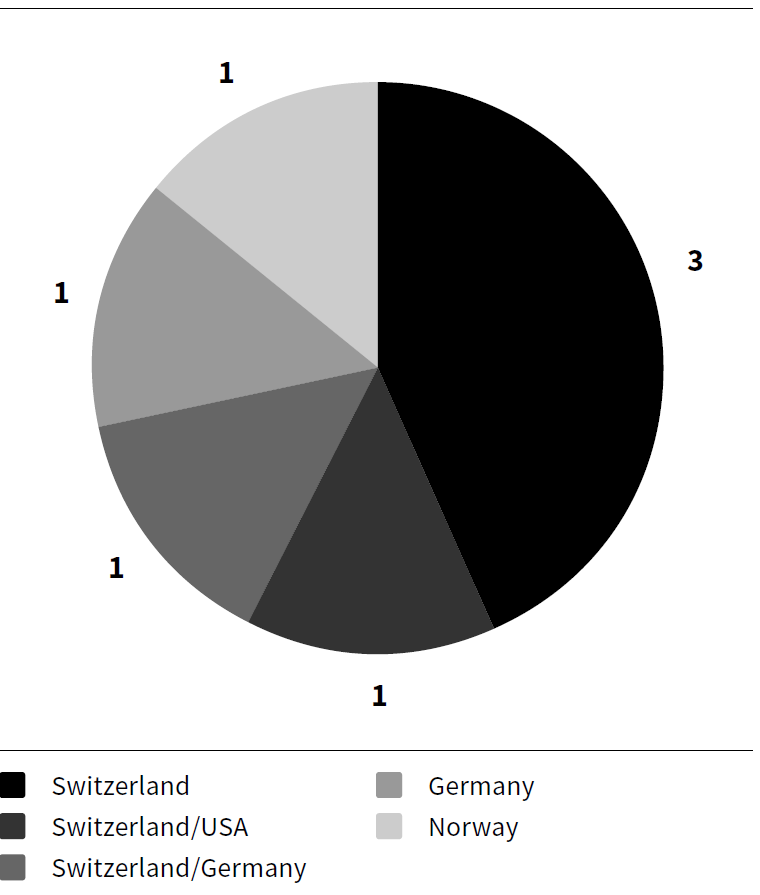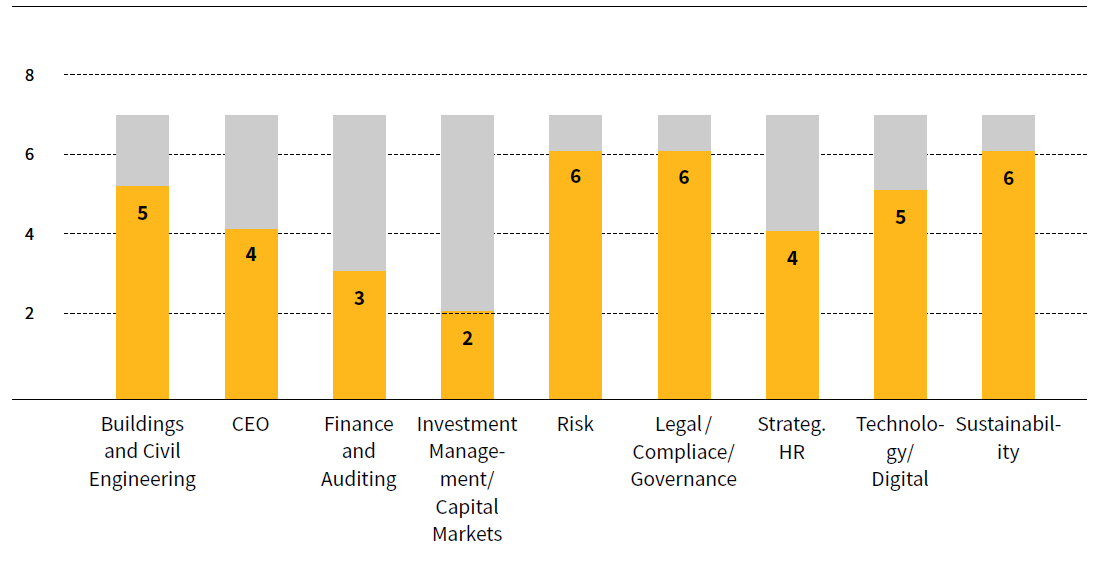Board of Directors
Content
Members of the Board of Directors
The Board of Directors, which should have at least five members according to the Articles of Association, currently has seven members. Laurent Vulliet no longer put himself forward for re-election at the Annual General Meeting on 28 March 2023. Raymond Cron was newly elected to the Board of Directors. No member performs any operational management duties for Implenia Ltd. or for any of its Group companies. Nor has any member of the Board of Directors belonged to the Implenia Executive Committee of Implenia Ltd. or any of the Group companies thereof during the last three financial years preceding the reporting period. No member maintains significant business relationships with the Implenia Group. The members are therefore independent. The Board of Directors is composed of the following members as of 31 December 2023:
Name | Nationality | Position | Independent | In office since¹ | ||||
Hans Ulrich Meister | Switzerland | Chairman | Yes | 2016 | ||||
Henner Mahlstedt | Germany | Vice-Chairman | Yes | 2015 | ||||
Kyrre Olaf Johansen | Norway | Member | Yes | 2016 | ||||
Martin Fischer | Switzerland and USA | Member | Yes | 2018 | ||||
Barbara Lambert | Switzerland and Germany | Member | Yes | 2019 | ||||
Judith Bischof | Switzerland | Member | Yes | 2022 | ||||
Raymond Cron | Switzerland | Member | Yes | 2023 | ||||
1 Annual General Meeting in the designated year | ||||||||
Each year, the Nomination and Compensation Committee conducts an assessment of the composition, organisation, culture, working procedures and performance of the Board of Directors. The results of the assessment and possible improvements are discussed in the plenary Board of Directors. The succession plan of the Board of Directors and Management Board are likewise a constant agenda item of the annual meeting of the Nomination and Compensation Committee, followed by reporting and discussion in the plenary BoD meeting.
The current composition of the Board of Directors covers a number of areas of competence. The members have many years of professional experience in a variety of industries. In the course of the annual assessment, the Board of Directors concluded that the size of the Board of Directors is in line with the size and complexity of the Company. An increase in the number of members is therefore not advisable. The graphs on the right illustrate the diversity of the Board of Directors.
Education, activities and vested interests
The summary on the next pages provides essential information about the education and career path of each member of the Board of Directors. It also discloses the mandates held by each member of the Board of Directors outside the Group as well as any further significant activities and permanent positions in significant interest groups.
Number of permissible activities
According to Art. 22e of the Articles of Association, each Board Member may hold no more than 14 mandates as a director or officer of legal entities outside the Implenia Group (no more than four of which may be held in exchange-listed companies), which are to be registered in the Swiss Commercial Register or a similar foreign register. If mandates are held in different legal entities of one and the same corporate group or are held on behalf of a corporate group or a legal entity, then these will be counted in their entirety as one mandate in each case. According to the above-cited provision of the Articles of Association, it is permissible to exceed the foregoing limits for short periods.
The Articles of Association with the exact wording of the above-cited provision can be viewed on Implenia's website.
https://implenia.com/goto/corporategovernance/2023/en/articles-of-association-20230328.pdf
Moreover, the NCC conducts an annual review of the external mandates held by individual members of both the Board of Directors and Management Board. Similarly, any new external mandates require prior approval from the Chairs of the Board of Directors and of the Nomination and Compensation Committee. The objective in both cases is to avoid overloading the BoD and Management Board members and prevent potential conflicts of interest.
Election and term of office
The members of the Board of Directors have a one year term of office. It commences with the election and ends after the close of the next annual General Meeting, without prejudice to prior resignation or prior removal from office (Art.18 (3) of the Articles of Association). The members of the Board of Directors shall be re-electable (Art.18 (4) of the Articles of Association). Both the chairperson and the members of the Board of Directors as well as the Nomination and Compensation Committee members shall each be elected individually by the General Meeting (Art. 9 (b) and Art.18 (2) of the Articles of Association). Similarly, the independent proxy is elected by the General Meeting (Art. 9 (b) of the Articles of Association). Moreover, the Board of Directors generally constitutes itself and, in particular, appoints its Vice-Chairman and secretary of the Board of Directors.
Internal organisation
Division of responsibilities on the Board of Directors
The Board of Directors is responsible for the strategic and financial management of Implenia and the supervision of its management. It adopts resolutions as the highest corporate body, except in matters for which the General Meeting is competent by law. The Chairman of the Board of Directors shall call the Board of Directors' meetings. If the Chairman is unable to call the meeting, the meeting shall be called by the Vice-Chairperson or, if need be, by a member of the Board of Directors designated to that purpose by the Board of Directors. The CEO and CFO shall attend the Board of Directors meetings on a regular basis. The Chairman shall determine the agenda and prepare and direct the meetings. The Chairman shall also decide on a case-by-case basis whether to involve others in the deliberations of the Board of Directors. Board of Directors' meetings may be called by any member of the Board of Directors by specifying the agenda item and giving a short justification for the call.
The duties, responsibilities and working procedures of the Board of Directors, as well as its conduct in case of conflicts of interest, are regulated by the Implenia OR and Table of Responsibilities of 11 August 2023 (hereinafter "Table of Responsibilities"). The Implenia OR (without the Table of Responsibilities) can be found on Implenia's website.
https://implenia.com/goto/corporategovernance/2023/en/or-implenia-20230811.pdf
Breakdown of the members of the committees of the Board of Directors, their duties and areas of responsibility
The Board of Directors has the following two internal committees in the reporting year: the Audit Committee (AC) and the Nomination and Compensation Committee (NCC). The Board of Directors elects one Chair per committee. The AC and NCC analyses the areas assigned to them by the Board of Directors and submit reports to the Board of Directors to assist with the preparation of its resolutions or the performance of its supervisory duties. The Chairs of the individual committees inform the Board of Directors of all the essential points and make recommendations on decisions to be made by the plenary Board of Directors. The committees' duties and responsibilities are defined in the Implenia OR, the Table of Responsibilities and the regulations issued by the Board of Directors.
The committees generally organise themselves. The Board of Directors shall enact appropriate regulations at request of the committees. The committees shall generally have an advisory function, with decision-making authority reserved for the plenary Board of Directors. The committees shall have decision-making authority only where so determined in the Table of Responsibilities or in a Committee's Regulation or by a special Board of Directors resolution. The committees are authorised to conduct or have investigations conducted on all matters within their area of responsibility. They may call upon the services of independent experts. The Board of Directors may appoint ad hoc committees for certain tasks and assign preparatory, supervisory and / or decision-making authority to such committees (sections 5.1.1 and 5.1.6 of the Implenia OR). No ad-hoc-committee was formed in the reporting year. The table below shows the committees existing in the reporting year and their members:
Audit Committee | Nomination and Compensation Committee | |||
Hans Ulrich Meister, Chairman | (standing guest) | (standing guest) | ||
Raymond Cron | • | |||
Judith Bischof | • | |||
Martin Fischer | • | |||
Kyrre Olaf Johansen |
| • (Chair) | ||
Barbara Lambert | • (Chair) | |||
Henner Mahlstedt | • |
Audit Committee
The AC is independent and shall consist of at least two members of the Board of Directors designated by the Board of Directors. The AC is chaired by Barbara Lambert, a member of the Board of Directors with proven expertise in auditing and finance as well as ESG reporting. The AC shall perform all of the Board of Directors' duties relating to accounting oversight and organisation, financial controlling (including the internal control system), financial planning and risk management. Risk management shall include reporting on (current or impending) legal actions. In addition, the AC shall monitor and report on the Compliance Management System to the Board of Directors. The AC shall coordinate and define the internal and external auditing tasks and be responsible for regular communications with the internal and external auditors and formulate the internal and external audit engagements. It shall have the authority to order special audits (section 5.1.1 of the Implenia OR). For more information about the ACʼs tasks, also see the Implenia OR:
https://implenia.com/goto/corporategovernance/2023/en/or-implenia-20230811.pdf
Nomination and Compensation Committee
The NCC shall be composed of two to four members of the Board of Directors who are elected individually by the General Meeting. The general principles of the duties and responsibilities of the NCC concerning compensation have been established by the General Meeting in Art. 21a of the Articles of Association and are described in greater detail in the Remuneration Report(pages 62 et seq.).
For more information about the NCCʼs tasks, also see the Implenia OR:
https://implenia.com/goto/corporategovernance/2023/en/or-implenia-20230811.pdf
Working procedure of the Board of Directors and its committees
The Board of Directors and its committees shall meet as often as required by business, at least six times (Board of Directors) resp. three times (AC and NCC) per year. The meetings shall be held at the invitation of the Chair of the relevant committee and accompanied by an agenda and meeting documents each time. Moreover, each member can call a meeting and request the inclusion of additional agenda items. The meetings of the Board of Directors and of the committees shall be presided over by their respective Chair. The presence of the majority of the members shall constitute a quorum. Members who participate in the meeting via telephone or videoconference shall be deemed present, too.
The resolutions and votes of the Board of Directors and its committees shall be carried by a majority of the voting members present. Abstentions are not permitted. In case of a tie vote, the Chair shall have the casting vote. The results of the negotiations and resolutions shall be recorded in the minutes. The Chairman of the Board of Directors shall decide whether or not the CEO participates (section 3.3.6 of the Implenia OR). In case of need, further IEC members or other persons may be invited to the meetings. Moreover, the Division and Function Heads shall report once a year on their division or function; in addition, the Division Heads shall give semi-annual and annual reports at the respective meetings of the Board of Directors.
The Chairman of the Board of Directors shall participate in the meetings of the AC and of the NCC as a permanent guest. Further participants in the AC generally include the CEO, CFO and General Counsel and, if necessary, a representative of Internal Audit and one or more representatives of the external auditor and other persons designated by the Chair. The CEO and Chief Human Resources Officer generally participate in the NCC meetings. Guests of the meetings of the Board of Directors and of the committees generally have no right to vote. In addition, the IEC members cannot attend meetings of the NCC or of the Board of Directors whenever their own performance or compensation is being discussed. The following tables give anoverview of the physical and video meetings of the Board of Directors and of the AC and NCC in 2023:
Board of Directors1 | Audit | Nomination and | |
Number of meetings (incl. video and telephone conferences) | 13 | 3 | 35 |
Number of members | 7 | 3 | 3 |
Duration (average in hours) | 2:552 | 4:10 | 1:10 |
| Presence | 97% | 100% | 89% |
Hans Ulrich Meister, Chairman | 12 of 13 | standing guest | standing guest |
Henner Mahlstedt, Vize-Chairman | 13 of 13 | 3 of 3 | - |
Judith Bischof, Member | 13 of 13 | 3 of 3 | - |
Raymond Cron, Member since 28.3.20236 | 9 of 9 | - | 2 of 2 |
Martin Fischer, Member | 13 of 13 | - | 3 of 3 |
Kyrre Olaf Johansen, Member | 11 of 13 | - | 2 of 3 |
Barbara Lambert, Member | 13 of 13 | 3 of 3 | - |
Laurent Vulliet, Member until 28.3.20237 | 4 of 4 | 1 of 1 |
1 The IEC was usually present in the person of the CEO.
2 This is the effective duration of the session. Three Board meetings in 2023 (April, June and October) were held as two-day meetings carried out with site visits and meetings with the local management.
3 The Chairman of the Board of Directors, the CEO, the CFO and the General Counsel as well as the auditors attended all meetings.
4 The CEO, the Chief Human Resources Officer and the Head of Compensation & Benefits attended all meetings, the Chairman of the Board of Meetings took part in two meetings.
5 In addition, supplementary and preparatory meetings and telephone conferences were held. Some of these sessions took place in the full Board of Directors or involved third parties when deemed necessary.
6 Elected to the Board of Directors on 28 March 2023.
7 Resigned from the Board of Directors on 28 March 2023.
Definition of areas of responsibility
The overall management and supervision of the Group is assigned by law to the Board of Directors. In addition to the responsibilities reserved to the Board under Art. 716(a) of the Swiss Code of Obligations, the Board of Directors rules on the following major transactions in accordance with the Table of Responsibilities:
- the acquisition or sale of holdings with an enterprise value of CHF 25 million or more;
- the purchase and sale of land /buildings / areas (commercial properties) worth more than CHF 30 million;
- the determination of target markets and the resolution to enter a market;
- the determination of the principles of the financial policy (debt-to-equity ratio and financial indicators);
- determination of the financing plan;
- procurement of outside capital of CHF 50 million or more (credit lines, bonds, private investments and other capital market transactions, finance leasing, hire-purchase activities, etc.);
- Fundamental issues and guidelines relating to the investment of financial resources;
- the granting of any kind of loan of CHF 5 million or more to third parties;
- the granting of group guarantees and sureties, other guarantees, bid, performance and payment bonds etc., other security interests and entering into contingent liabilities outside of the ordinary course of business of CHF 5 million or more; and
- the use of financial derivatives when not used strictly for hedging purposes.
Moreover, the Board of Directors is in charge of determining the sustainability strategy.
The Board of Directors delegates the management of the Implenia Group to the CEO, unless provided otherwise by law, by the Articles of Association or the Implenia OR, and insofar as such powers have not been delegated to the IEC or to individual members of the IEC. The CEO shall take care of the management and representation of the Implenia Group, unless delegated to other governing bodies by law, by the Articles of Association or by the Implenia OR. He is responsible for the conduct of business and representation of the Group, in particular, for leadership of its operations and the implementation of corporate strategy. Insofar as such powers have not been reserved to the Board of Directors, the CEO is authorised to organise, perform and/or delegate to qualified subordinates the duties and powers assigned to him according to the Implenia OR, subject to providing such subordinates with proper instructions and supervision.
The CEO shall be assisted with the conduct of business by members of the IEC and other Function Heads. They report directly to him. The CEO is responsible for reporting to the Chairman of the Board of Directors and/or to the Board of Directors (section 6.2.3 of the Implenia OR). For the details of the division of responsibilities among the Board of Directors, CEO and IEC, see the Implenia OR and Table of Responsibilities.
https://implenia.com/goto/corporategovernance/2023/en/or-implenia-20230811.pdf
Information and control instruments with respect to the Management Board
In order to monitor how the CEO and members of the IEC perform their assigned responsibilities, the following information and control instruments are available to the Board of Directors, among others:
Information and control tools | ||||||||
Annual | Semiannual | Quarterly | Monthly | |||||
Financial report | • | |||||||
Budget | • | |||||||
Three-year plan | • | |||||||
VAC-Reporting | • | |||||||
Group risk situation | • | |||||||
Result Delivery Assessment (RDA) | • | |||||||
Litigation-Reporting | • | |||||||
Compliance-Reporting | • | |||||||
The IFRS Financial Reporting shall be delivered to the Board of Directors quarterly. The Half-Year Report is subject to approval by the Board of Directors and then released for publication.
As part of the budget planning for the following year, the indicators, like those of the MIS, are determined based on the expected economic trend and specified together with the corporate objectives for each Division. Such indicators are used as a basis for budgeting the balance sheet, income statement, cash flow statement and liquidity planning. The annual planning for the next three calendar years (three-year plan) is performed like the budget planning.
The Implenia Group's risk position is assessed twice a year by the IEC and the Board of Directors. The main group risks are defined and evaluated in terms of scope and probability. The implementation and impact of the specified measures are monitored constantly by the IEC. When assessing the operational risks, current or impending legal actions are taken into account, as well as major scope changes in construction projects. The related reports show the risks and opportunities at the Group and Division levels and are constantly updated by the operational managers in cooperation with the Legal and Finance functions, in order to introduce measures and monitor their effectiveness. As part of the Result Delivery Assessment (RDA) reporting, management reports on the volume of completed and open claims at each regular AC meeting.
All the divisional projects and the choice of construction consortium partners shall undergo in-depth evaluation thanks to the value assurance process, with the Value Assurance Committee (VAC) acting as the steering body. The VAC has been set up on four levels: Group (class 1), Global Division (class 2), Country Unit (class 3) and Regional Unit (class 4). In the VAC reports, VAC class 1 shall give the AC reports, at least every six months, on the outcome of its assignments and the appropriateness and effectiveness of the project management.
Litigation reports on (current or impending) legal actions are given in each ordinary Audit Committee meeting.
As part of the compliance reporting, a report is given in each ordinary AC meeting on the Compliance Management System in general and, in particular, on compliance cases, the state of progress in the investigations and the measures taken.
The Internal Control System is audited by the external auditor as required by law, and the resulting report is given to the Board of Directors (Art. 728a (1) (3) and 728b (1) of the Swiss Code of Obligations). The reports on the individual information instruments are prepared and consolidated by the Finance and Legal functions. They are then delivered simultaneously to the Board of Directors and the IEC. At the meetings of the IEC and AC, the reports are presented by the CFO respectively by the General Counsel and commented on.
The CEO and CFO each provide detailed information about the course of business, comment on it and answer the questions of the members of the Board of Directors and AC.
The Board of Directors has engaged a recognised audit firm to conduct the internal audit. That audit firm was replaced by a Head of Group Internal Audit on 1 January 2024. The AC determines the focal points of the internal audit based on a multi-year audit plan. The focal points in the reporting year were the topics of Western Switzerland, Cyber Security, Joint Ventures and a follow-up on past audits. The Internal Audit's audit plan is implemented in coordination with the CFO. Internal Audit created the audit plan according to the reports that the AC submitted together with the necessary comments and recommendations. Internal Audit reports directly to the AC. The reports of Internal Audit are transmitted to the external auditor without limitation. A regular exchange of information takes place between Internal and External audit.
Environmental, Social and Governance (ESG) Management
Environmental, social and corporate governance actions form an integral part of Implenia's core values and are continuously monitored by the Board of Directors. The Sustainability Committee, which was set up in 2019, consists of representatives of all divisions and functions. The Sustainability Committee reports directly to the IEC, which in turn reports on regular basis to the Board of Directors. The sustainability strategy is finally approved by the Board of Directors. Given the size of the Board of Directors and the strategic importance of the topic, sustainability shall be discussed by the plenary Board of Directors. That is also why no separate Board of Directors committee has been formed. The 2023 Sustainability Report will be published at the same time as the Annual Financial Report.

Hans Ulrich Meister
Member1 and Chairman of the Board of Directors
Born 1959
Swiss citizen
Non executive/independent
Education
Advanced Management Program, Harvard Business School
Advanced Management Program, Wharton School
Business degree, Zurich University of Applied Sciences
Professional experience
2008 – 2015 Member of management of Credit Suisse Group AG and Credit Suisse AG
2012 – 2015 Head of the Private Banking & Wealth Management Division, responsible for the Private Banking business in EMEA and Asia Pacific at Credit Suisse AG
2011 – 2012 CEO of the Private Banking Division at Credit Suisse AG
2008 – 2015 CEO of Credit Suisse, Switzerland Region
2005 — 2007 Head of Private and Corporate Customers Switzerland at UBS
2004 – 2007 Member of the Group Managing Board of UBS Group
2003 — 2004 Head of Large Corporates & Multinationals at UBS
2002 Wealth Management of UBS, New York
Additional memberships on boards of directors
Ina Invest Holding Ltd (Member of the Board of Directors and Chair of the Audit Committee) - listed
1 Since March 2016

Henner Mahlstedt
Member2 and Vice-Chairman of the Board of Directors and member of the Audit Committee
Born 1953
German citizen
Non executive/independent
Education
Civil engineering, Braunschweig Technical University
Professional experience
Since 2012 Managing shareholder of Mahlstedt Consultants GbR
2007— 2012 Member of the Global Executive Committee of Hochtief AG
2010— 2012 Chairman of the Executive Board of Hochtief Solutions AG
2007— 2010 Chairman of the Executive Board of Hochtief Construction AG
2005— 2007 Member of the Executive Board of Hochtief Construction AG
2003— 2005 Division Head for the new German federal states at Hochtief Construction AG
2001— 2003 Chairman of the Management of Pegel & Sohn GmbH
1997— 2001 Member of the Executive Board of Strabag Hoch- und Ingenieurbau AG
1980—1997 Various positions within Strabag Hoch- und Ingenieurbau AG
Additional functions and offices
Member of the Advisory Board of Huesker Synthetic GmbH
Member of the Board of Trustees of Diakonie Kaiserswerth
2 Since March 2015

Kyrre Olaf Johansen
Member3 of the Board of Directors and Chair of the Nomination and Compensation Committee
Born 1962
Norwegian citizen
Non executive/independent
Education
Business Candidate, BI Norwegian Business School
MSc Civil Engineer, NTNU Trondheim
Professional experience
since 2013 CEO of Norsk Mineral AS
2008 — 2012 CEO of Entra Eiendom AS
2003 — 2008 CEO of Mesta AS
2000 — 2003 CEO of the Road Construction Division of NCC Industry
1999 — 2003 Region Head of NCC in Norway
1991 — 1998 Various leadership positions for construction work at ABB Power Generation AG
1986 — 1991 Engineering consultant
3 Since March 2016

Martin Fischer
Member4 of the Board of Directors and member of the Nomination and Compensation Committee
Born 1960
Swiss and American citizen
Non executive/independent
Education
Ph.D. in Civil Engineering, Stanford University
M.S. in Industrial Engineering, Stanford University
Diploma in Civil Engineering, EPF Lausanne
Professional experience
Since 2006 Professor for Civil and Environmental Engineeringat Stanford University
1999 – 2001 Associate Professor for Civil and Environmental Engineering at Stanford University
1992 – 1999 Assistant Professor for Civil and Environmental Engineering at Stanford University
1991 – 1992 Acting Assistant Professor for Civil and Environmental Engineering at Stanford University
1984 – 1991 Various positions in industry and at colleges and universities in Switzerland, Germany, the USA, and Japan
Additional memberships on boards of directors
sfirion AG (Chairman of the Supervisory Board)
Cadwork Informatik CI AG (member)
Control AG (member)
4 Since March 2018

Barbara Lambert
Member1 of the Board of Directors and Chair of the Audit Committee
Born 1962
Swiss and German citizen
Non-executive / independent / finance and audit expert
Education
Degree in Economics, University of Geneva
Certified Public Accountant
Banker
Professional experience
2008 – 2018 Member of the Management Committee and Group Chief Risk Officer at Banque Pictet & Cie SA
2002 – 2007 Partner at Ernst & Young, Head of Banking and Insurance Auditing
1987 – 2002 Partner at Arthur Andersen, Switzerland
Additional memberships on boards of directors
UBS Switzerland AG and Credit Suisse (Switzerland) Ltd. (Member of the Board of Directors, Member of the Audit Committee and Chair of the Risk Committee)
Deutsche Börse AG (Member of the Supervisory Board, Chair of the Audit Committee and Member of the Risk Committee) – listed
SYNLAB AG (Member of the Supervisory Board, Chair of the Audit and Risk Committee) (until 31.3.2024) - listed
Merck KGaA (Member of the Supervisory Board, Chair of the Audit Committee)
Additional functions and offices
Member of the Advisory Board of the Geneva School of Economics and Management
1 Since March 2019

Judith Bischof
Member2 of the Board of Directors and Member of the Audit Committee
Born 1974
Swiss citizen
Non executive/independent
Education
Attorney-at-law
Dr. iur., University of Zurich
Executive MBA HSG, University of St. Gallen
Master of International Business and Law, University of Sydney
Professional experience
Since 2022General Counsel and member of the Executive Leadership Team of Clariant Ltd
2011– 2017General Counsel and member of the Executive Committee as well as Secretary to the Board of Directors of RUAG International Holding Ltd
2011– 2017General Counsel and Member of the Executive Committee of Ascom Holding Ltd.
2005– 2011Attorney-at law, Lenz & Staehelin Zurich
2002– 2004Law Clerk, District Court of Zurich
2 Since March 2022

Raymond Cron
Member3 of the Board of Directors and member of the Nomination and Compensation Committee
Born 1959
Swiss citizen
Non executive/independent
Education
Degree in Civil Engineering from the Swiss Federal Institute of Technology (ETH) in Zurich
Postgraduate program in Technical Business Administration, ETH in Zurich, BWI (Institute for Industrial Management)
Professional experience
Since 2015 Managing Director and Owner of CMC Cron Management Consult AG
Since 2015 Managing Director, Switzerland Innovation Foundation
2013 – 2015 Head of Realisation and Member of Group Management, Allreal Generalunternehmung AG
2008 – 2013 COO and Member of Group Management, Orascom Development Holding Ltd
2004– 2008 Director of the Federal Office of Civil Aviation
1989 – 2004 Divisional Head and Member of Group Management, BATIGROUP Holding AG
Additional memberships on boards of directors
St. Clara AG (Chair of the Board of Directors)
UZB Basel University Centre of Dentistry (Chair of the Board of Directors)
Basel-Mulhouse Airport (Vice-Chair of the Board of Directors)
Additional functions and offices
Albert Lück Foundation (Chair of the Board of Trustees)
3 Since March 2023
To the complete Annual Report 2023 as PDF



